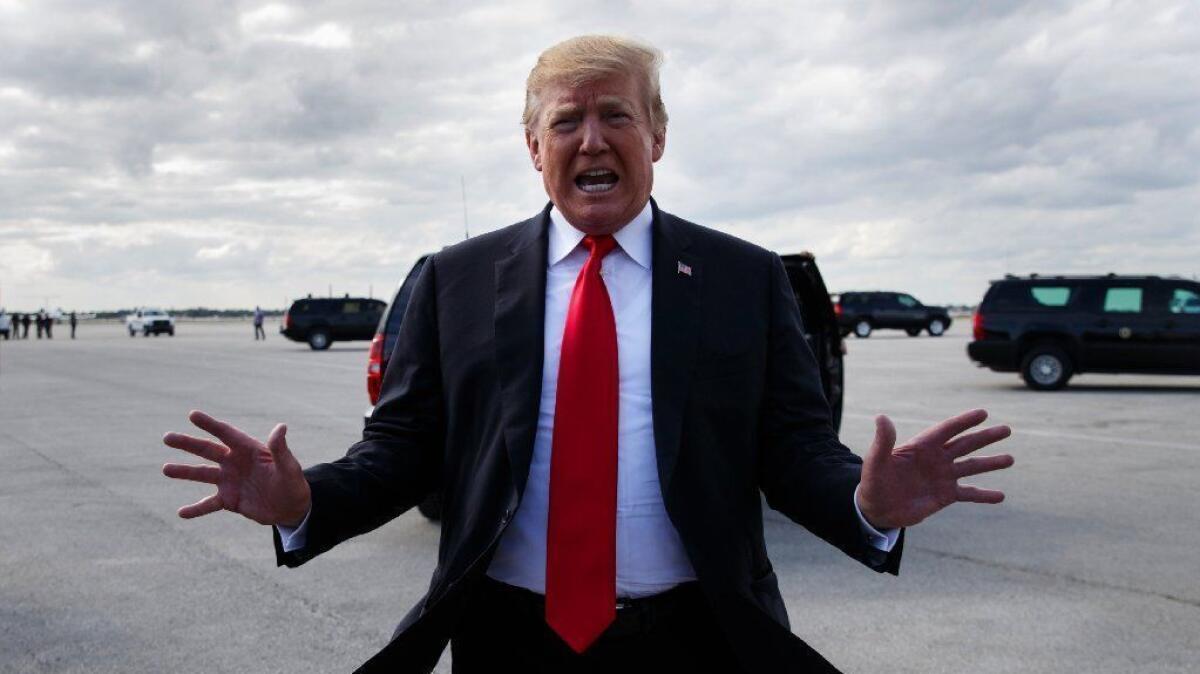Column: Post-Mueller, Congress must demand answers to important questions that remain

- Share via
Reporting from Washington — Special counsel Robert S. Mueller III’s investigation of President Trump is over. But congressional investigations into the president’s conduct will continue — and they should.
Trump and his allies want to turn Mueller’s finding that the president did not knowingly collude with Russia during his 2016 campaign into a blanket get-out-of-jail-free card.“Complete and Total EXONERATION,” Trump tweeted in his electronic version of a shout.
But shouting doesn’t make it true.
Mueller’s mandate was to investigate “links [or] coordination” between the Russian government and the Trump campaign. He found nothing that merited prosecution. That’s the exoneration, and it’s significant; it means Trump will almost surely complete his term without facing impeachment.
But the special counsel explicitly said he could not “exonerate” Trump on charges of obstruction of justice — that much we know even from the selectively brief summary that Atty. Gen. William Barr has given us. Barr decided to clear his boss on that count, but Mueller didn’t.
READ MORE: Everything you need to know about who’s been charged in the Russia case »
More important, questions about the president’s actions extend well beyond the two issues Mueller focused on. That’s why Congress should keep investigating, no matter how angry Trump gets.
Members of both parties in the House and Senate are already pressing — with varying levels of ardor — for the release of Mueller’s full report and the underlying evidence. All we have now is that four-page summary from Trump’s attorney general.
Beyond that, here are three issues Congress should continue to probe:
First, Russia’s interference in our elections. Mueller found that Russia’s meddling was real, although Trump has rejected that conclusion when it comes from U.S. intelligence agencies.
The president seems to resent the finding because it impugns the legitimacy of his election. His feelings are far less important, however, than the need to prevent another round of Russian meddling in 2020.
Happily, there’s bipartisan support for work on this issue in both the Republican-led Senate and the Democratic-led House.
Second, Trump’s past business dealings with Russia — and his present connections, if any. Mueller looked into that issue, but Barr’s summary is silent on it.
There’s a long, strange record of Trump and his lieutenants trying to strike real estate deals in Moscow and then denying it. “I have no deals that could happen in Russia, because we’ve stayed away,” Trump said in 2017. “I think that would be a conflict.”
But after his former lawyer, Michael Cohen, testified about Trump’s negotiations during the campaign to build a skyscraper in Moscow, the president changed his story and admitted he had sought a deal. “There would have been nothing wrong if I did do it,” he said.
The Democratic chairman of the House Intelligence Committee, Rep. Adam B. Schiff of Burbank, argues that the project created a conflict of interest. “We need to determine whether the president and anybody around him is compromised by a foreign power,” Schiff said before the Mueller report was concluded.
That’s an explosive question. Yet in view of Trump’s inconsistent answers, it ought to be cleared up.
Third, Trump’s continued ownership of private businesses, a break from recent precedent. Critics have charged that foreign governments and U.S. corporations are currying favor with the White House by doing business with the president’s Washington hotel. The charge may be unfair — but if Trump wants to operate a business on the side, he should be subject to oversight.
The response from Republican leaders in Congress, predictably, has been that Mueller’s findings mean most of these questions are no longer worth looking into. It’s time, they say, to “move on.”
But Trump doesn’t sound ready to move on. He wants to relitigate the investigation and investigate his investigators.
“There are a lot of people out there that have done some very, very evil things,” he said Monday. “Those people will certainly be looked at.”
We can wring our hands over a political culture that seems hooked on scandal. Both parties periodically fall prey to the Watergate fantasy, the notion that relentless investigation can bring down a president. (That clearly happened to some Democrats as they awaited the Mueller report.)
And congressional investigations will inevitably be suffused with politics, whether they’re run by Democrats in the Houseor Republicans in the Senate.
But Congress is the only body we have that’s empowered to keep an eye on the president. Investigating Trump is its duty, just as earlier Congresses sought oversight over Barack Obama and George W. Bush. The question is whether the investigations are reasonable or abusive.
So as House Democrats pursue their long list of investigations, they might seek a lesson from their comedown over Mueller’s conclusions.
Aim for methodical investigations without stoking expectations — more staff work, fewer showy hearings. Dial back the rhetoric. Unearth evidence and let it speak for itself. But don’t let up. That’s how the system ought to work.
More to Read
Get the L.A. Times Politics newsletter
Deeply reported insights into legislation, politics and policy from Sacramento, Washington and beyond. In your inbox three times per week.
You may occasionally receive promotional content from the Los Angeles Times.











